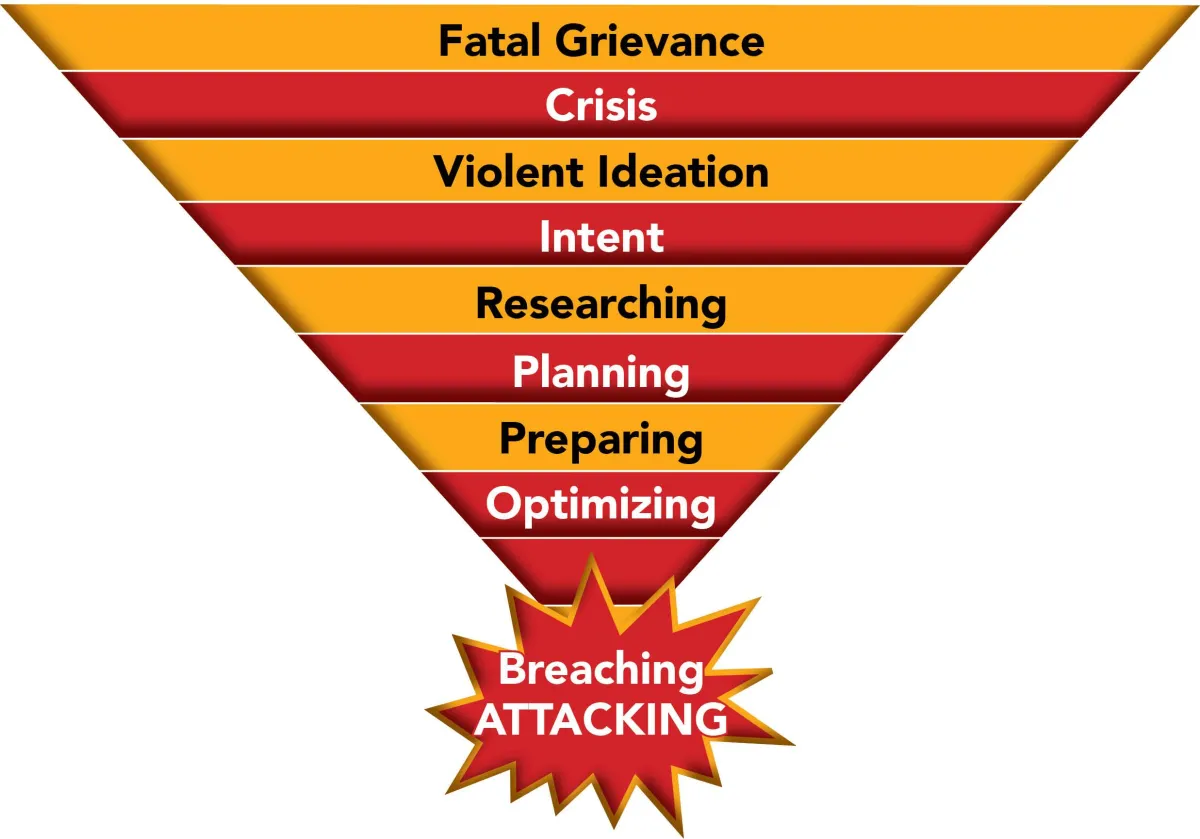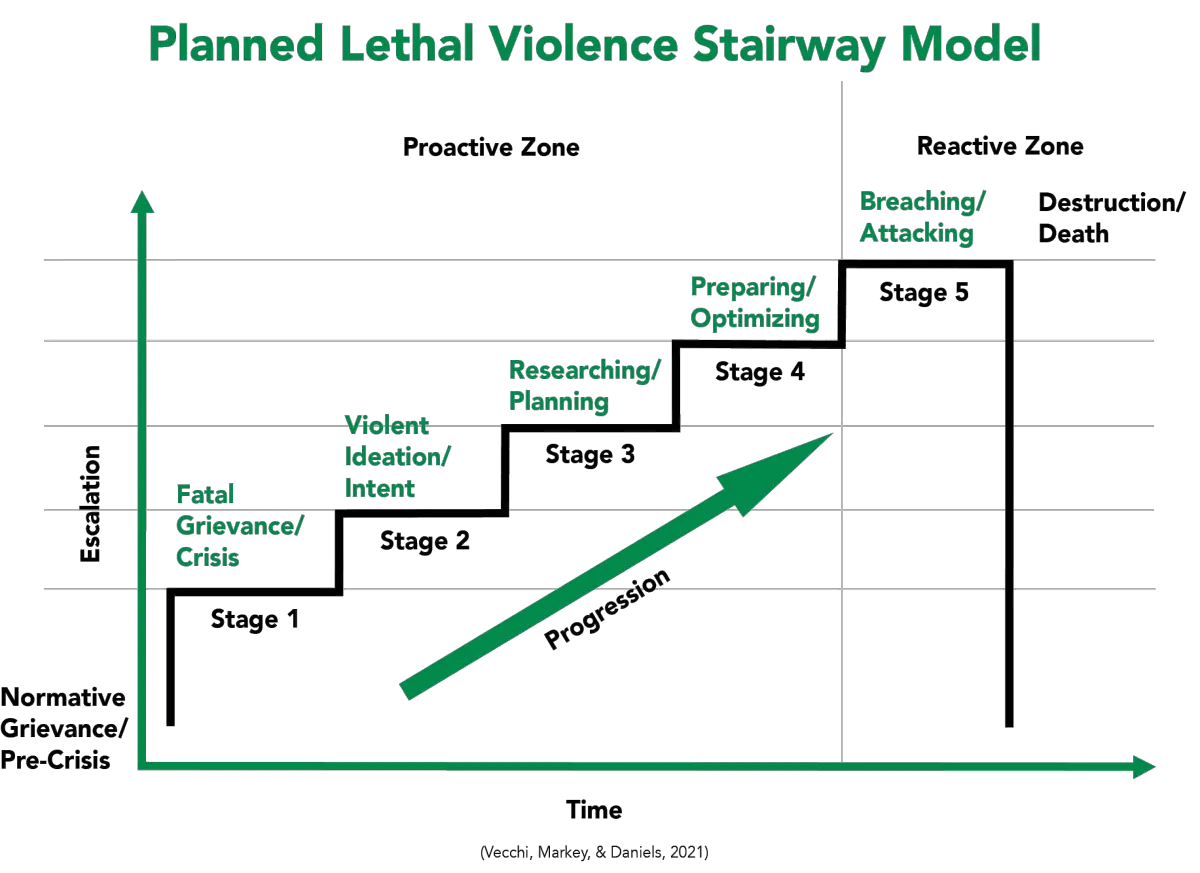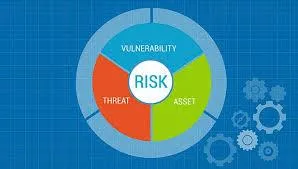THREAT PREVENTION
THREAT PREVENTION
TRAINING

VGI Threat Detection and Reporting Certificate
This certificate course consists of 4 contact hours of instruction on the observation skills necessary to successfully identify, evaluate, and report concerning behaviors of planned lethal violence in the workplace and educational settings.
Offender Motivation and Behavior
Pre-Attack Indicators of Targeted Violence
Behavioral Baselines and Anomalies
Accurate Reporting
Case Studies and Scenario-Based Exercises

VGI Behavioral Threat Assessment Certification
This certification course consists of 16 contact hours of instruction in behavioral threat assessment methods for identifying, preventing, and mitigating planned lethal violence in the workplace and educational settings. It equips the participant with the knowledge and skills to identify, classify, and engage individuals who pose a threat. Emphasis is placed on assessing if a person of concern is on the pathway to violence and classifying the level of threat to determine appropriate interventions while avoiding false positives and false negatives. This course also covers behavioral threat assessment team structure and investigative procedures, including interviewing, evidence collection, and writing safety plans.
Planned Lethal Violence
Pathway to Violence
Direct and Sequential Behaviors
Avoiding False Positives and Negatives
Case Studies and Scenario-Based Exercises

VGI Behavioral Threat Detection and Assessment Instructor Certification
This course comprises 16 contact hours and prepares professionals to instruct VGI behavioral threat detection and assessment courses based on the work of Gregory M. Vecchi, Ph.D. Emphasis is placed on subject-matter expertise, instructional methodologies, and practical teaching strategies to enhance the ability to train others in identifying, assessing, mitigating, and reporting potential threats of planned lethal violence in the workplace and educational settings.
Behavioral Threat Detection and Assessment Best Practices
Adult Learning Principles and Lesson Plans
Assessing Trainee Comprehension
Teach-Back Sessions
Case Studies and Scenario-Based Exercises

Risk Analysis, Vulnerability Assessment, and Violence Mitigatio
This course explores offender-based risk and vulnerability assessment principles and practices to prevent targeted violence in schools and workplaces. Participants will learn to evaluate physical, procedural, and cultural vulnerabilities, assess threats within specific environments, and identify protective measures to mitigate risks. Topics include environmental design, policy analysis, threat-specific risk factors, and integrating assessment findings into comprehensive safety planning. Through case studies and practical exercises, attendees will gain the tools to proactively reduce vulnerabilities and enhance security in educational and organizational settings.
Identifying and Analyzing Potential Risks
Developing Comprehensive Risk Mitigation Strategies
Best Practices for Conducting Vulnerability Audits
Assessing Vulnerabilities in Physical and Cyber Environments
Case Studies and Scenario-Based Exercises

VGI Threat Detection and Reporting Certificate
This certificate course consists of 4 contact hours of instruction on the observation skills necessary to successfully identify, evaluate, and report concerning behaviors of planned lethal violence in the workplace and educational settings.
Offender Motivation and Behavior
Pre-Attack Indicators of Targeted Violence
Behavioral Baselines and Anomalies
Accurate Reporting
Case Studies and Scenario-Based Exercises
VGI Behavioral Threat Assessment Certification
This certification course consists of 16 contact hours of instruction in behavioral threat assessment methods for identifying, preventing, and mitigating planned lethal violence in the workplace and educational settings. It equips the participant with the knowledge and skills to identify, classify, and engage individuals who pose a threat. Emphasis is placed on assessing if a person of concern is on the pathway to violence and classifying the level of threat to determine appropriate interventions while avoiding false positives and false negatives. This course also covers behavioral threat assessment team structure and investigative procedures, including interviewing, evidence collection, and writing safety plans.
Planned Lethal Violence
Pathway to Violence
Direct and Sequential Behaviors
Avoiding False Positives and Negatives
Case Studies and Scenario-Based Exercises


VGI Behavioral Threat Detection and Assessment Instructor Certification
This course comprises 16 contact hours and prepares professionals to instruct VGI behavioral threat detection and assessment courses based on the work of Gregory M. Vecchi, Ph.D. Emphasis is placed on subject-matter expertise, instructional methodologies, and practical teaching strategies to enhance the ability to train others in identifying, assessing, mitigating, and reporting potential threats of planned lethal violence in the workplace and educational settings.
Behavioral Threat Detection and Assessment Best Practices
Adult Learning Principles and Lesson Plans
Assessing Trainee Comprehension
Teach-Back Sessions
Case Studies and Scenario-Based Exercises
Risk Analysis,
Vulnerability Assessment, and Violence Mitigation
This course explores offender-based risk and vulnerability assessment principles and practices to prevent targeted violence in schools and workplaces. Participants will learn to evaluate physical, procedural, and cultural vulnerabilities, assess threats within specific environments, and identify protective measures to mitigate risks. Topics include environmental design, policy analysis, threat-specific risk factors, and integrating assessment findings into comprehensive safety planning. Through case studies and practical exercises, attendees will gain the tools to proactively reduce vulnerabilities and enhance security in educational and organizational settings.
Identifying and Analyzing Potential Risks of Targeted Violence
Developing Comprehensive Risk Mitigation Strategies
Best Practices for Conducting Vulnerability Audits
Assessing Vulnerabilities in Physical and Cyber Environments Based on Known Offender Behavior
Case Studies and Scenario-Based Exercises




